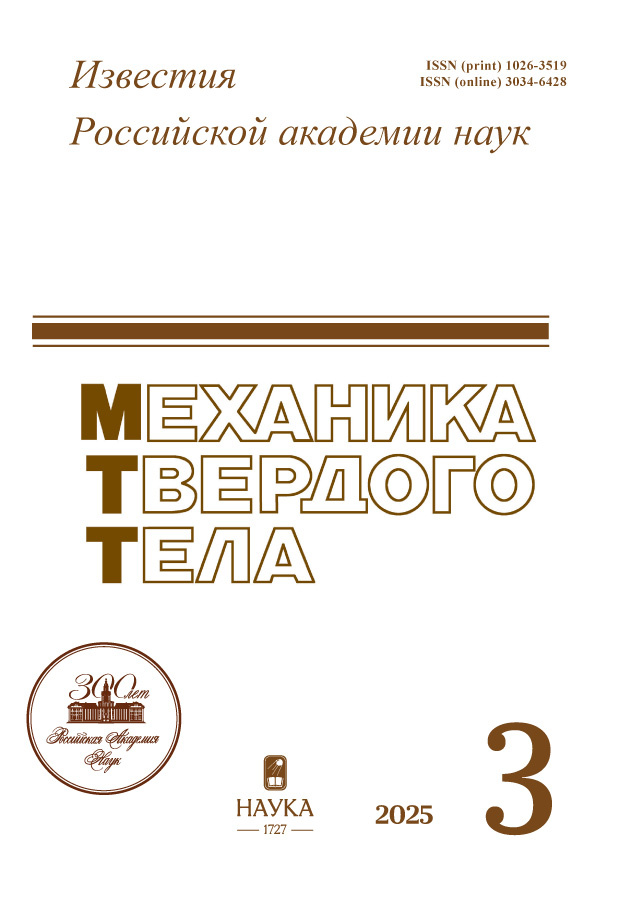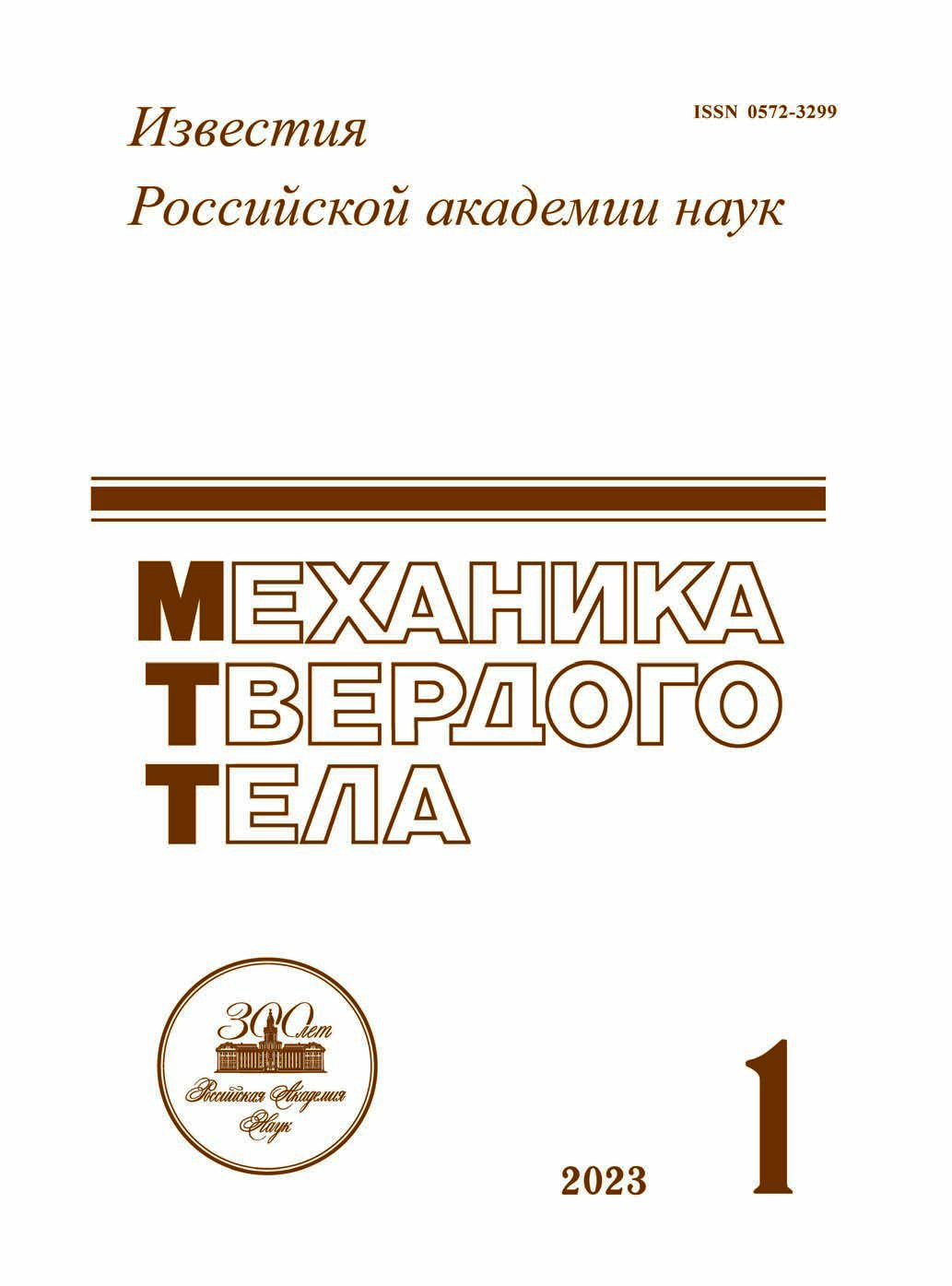ПРИМЕНЕНИЕ МЕТОДОВ ТЕОРИИ КРИТИЧЕСКИХ РАССТОЯНИЙ ДЛЯ ОЦЕНКИ РАЗРУШЕНИЯ КВАЗИХРУПКИХ МАТЕРИАЛОВ С ВЫРЕЗАМИ
- Авторы: Сукнев С.В.1
-
Учреждения:
- Институт горного дела Севера им. Н.В. Черского СО РАН
- Выпуск: № 1 (2023)
- Страницы: 129-141
- Раздел: Статьи
- URL: https://permmedjournal.ru/1026-3519/article/view/672882
- DOI: https://doi.org/10.31857/S0572329922100191
- EDN: https://elibrary.ru/KLQBAS
- ID: 672882
Цитировать
Полный текст
Аннотация
Рассмотрено применение различных методов теории критических расстояний для оценки разрушения отрывом квазихрупкой пластины с вырезом в виде кругового отверстия, подверженной одноосному растяжению, одноосному сжатию, а также совместному действию растягивающих и сжимающих напряжений. Расчеты критических напряжений выполнены на основе предложенного ранее подхода, в соответствии с которым структурный параметр нелокального критерия разрушения представляется в виде суммы двух слагаемых. Первое из них характеризует собственно структуру материала и является константой, а второе отражает образование неупругих деформаций и зависит от пластических свойств материала, геометрии образца и краевых условий. Проведено сопоставление результатов расчетов с известными экспериментальными данными.
Об авторах
С. В. Сукнев
Институт горного дела Севера им. Н.В. Черского СО РАН
Автор, ответственный за переписку.
Email: suknyov@igds.ysn.ru
Россия, Якутск
Список литературы
- Сукнев С.В. Критерий локальной прочности // Пробл. прочности. 2004. № 4. С. 108–124.
- Wieghardt K. Über das Spalten und Zerreisen elastischer Körper // Z. Math. Phys. 1907. V. 55. № 1–2. P. 60–103.
- Neuber H. Kerbspannungslehre, Grundlagen für eine genaue Spannungsrechnung. Berlin: Springer-Verlag, 1937. 160 p.
- Peterson R.E. Notch sensitivity // Metal fatigue. New York: McGraw Hill, 1959. P. 293–306.
- Новожилов В.В. О необходимом и достаточном критерии хрупкой прочности // ПММ. 1969. Т. 33. № 2. С. 212–222.
- Whitney J.M., Nuismer R.J. Stress fracture criteria for laminated composites containing stress concentrations // J. Compos. Mater. 1974. V. 8. № 4. P. 253–265.
- Kipp M.E., Sih G.C. The strain energy density failure criterion applied to notched elastic solids // Int. J. Solids Struct. 1975. V. 11. № 2. P. 153–173.
- Wu H.-C., Chang K.-J. Angled elliptic notch problem in compression and tension // Trans. ASME. J. Appl. Mech. 1978. V. 45. № 2. P. 258–262.
- Carter B.J., Lajtai E.Z., Yuan Y. Tensile fracture from circular cavities loaded in compression // Int. J. Fract. 1992. V. 57. № 3. P. 221–236.
- Radaj D., Zhang S. Process zone fracture criteria for crack tips // Eng. Fract. Mech. 1995. V. 50. № 1. P. 111–120.
- Seweryn A., Mroz Z. A non-local stress failure condition for structural elements under multiaxial loading // Eng. Fract. Mech. 1995. V. 51. № 6. P. 955–973.
- Mikhailov S.E. A functional approach to non-local strength condition and fracture criteria // Eng. Fract. Mech. 1995. V. 52. № 4. P. 731–754.
- Toribio J. A fracture criterion for high-strength steel notched bars // Eng. Fract. Mech. 1997. V. 57. № 4. P. 391–404.
- Yosibash Z., Bussiba A., Gilad I. Failure criteria for brittle elastic materials // Int. J. Fract. 2004. V. 125. № 3–4. P. 307–333. https://doi.org/10.1023/B:FRAC.0000022244.31825.3b
- Waddoups M.E., Eisenmann J.R., Kaminski B.E. Macroscopic fracture mechanics of advanced composite materials // J. Compos. Mater. 1971. V. 5. № 4. P. 446–454.
- Pugno N.M., Ruoff R.S. Quantized fracture mechanics // Philos. Mag. 2004. V. 84. № 27. P. 2829–2845. https://doi.org/10.1080/14786430412331280382
- Taylor D., Cornetti P., Pugno N. The fracture mechanics of finite crack extension // Eng. Fract. Mech. 2005. V. 72. № 7. P. 1021–1038. https://doi.org/10.1016/j.engfracmech.2004.07.001
- Hebel J., Dieringer R., Becker W. Modelling brittle crack formation at geometrical and material discontinuities using a finite fracture mechanics approach // Eng. Fract. Mech. 2010. V. 77. № 18. P. 3558–3572. https://doi.org/10.1016/j.engfracmech.2010.07.005
- Carpinteri A., Cornetti P., Sapora A. Brittle failures at rounded V-notches: a finite fracture mechanics approach // Int. J. Fract. 2011. V. 172. № 1. P. 1–8. https://doi.org/10.1007/s10704-011-9640-8
- Weißgraeber P., Leguillon D., Becker W. A review of Finite Fracture Mechanics: crack initiation at singular and non-singular stress raisers // Arch. Appl. Mech. 2016. V. 86. № 1–2. P. 375–401. https://doi.org/10.1007/s00419-015-1091-7
- Strobl M., Dowgiałło P., Seelig T. Analysis of Hertzian indentation fracture in the framework of finite fracture mechanics // Int. J. Fract. 2017. V. 206. № 1. P. 67–79. https://doi.org/10.1007/s10704-017-0201-7
- Sapora A., Torabi A.R., Etesam S., Cornetti P. Finite Fracture Mechanics crack initiation from a circular hole // Fatigue Fract. Eng. Mater. Struct. 2018. V. 41. № 7. P. 1627–1636. https://doi.org/10.1111/ffe.12801
- Taylor D. The theory of critical distances: a new perspective in fracture mechanics. Oxford: Elsevier, 2007. 284 p.
- Li W., Susmel L., Askes H., Liao F., Zhou T. Assessing the integrity of steel structural components with stress raisers using the Theory of Critical Distances // Eng. Fail. Anal. 2016. V. 70. P. 73–89. https://doi.org/10.1016/j.engfailanal.2016.07.007
- Fuentes J.D., Cicero S., Procopio I. Some default values to estimate the critical distance and their effect on structural integrity assessments // Theor. Appl. Fract. Mech. 2017. V. 90. P. 204–212. https://doi.org/10.1016/j.tafmec.2017.04.015
- Taylor D. The Theory of Critical Distances: A link to micromechanisms // Theor. Appl. Fract. Mech. 2017. V. 90. P. 228–233. https://doi.org/10.1016/j.tafmec.2017.05.018
- Vedernikova A., Kostina A., Plekhov O., Bragov A. On the use of the critical distance concept to estimate tensile strength of notched components under dynamic loading and physical explanation theory // Theor. Appl. Fract. Mech. 2019. V. 103. P. 102280. https://doi.org/10.1016/j.tafmec.2019.102280
- Justo J., Castro J., Cicero S. Notch effect and fracture load predictions of rock beams at different temperatures using the Theory of Critical Distances // Int. J. Rock Mech. Min. Sci. 2020. V. 125. P. 104161. https://doi.org/10.1016/j.ijrmms.2019.104161
- Pipes R.B., Wetherhold R.C., Gillespie J.W. (Jr.) Notched strength of composite materials // J. Compos. Mater. 1979. V. 13. P. 148–160.
- Tan S.C. Laminated composites containing an elliptical opening. II. Experiment and model modification // J. Compos. Mater. 1987. V. 21. № 10. P. 949–968.
- Сукнев С.В. Нелокальные и градиентные критерии разрушения квазихрупких материалов при сжатии // Физ. мезомех. 2018. Т. 21. № 4. С. 22–32. https://doi.org/10.24411/1683-805X-2018-14003
- Сукнев С.В. Разрушение квазихрупкого геоматериала с круговым отверстием при неравномерно распределенном сжатии // ПМТФ. 2019. Т. 60. № 6. С. 162–172. https://doi.org/10.15372/PMTF20190617
- Suknev S.V. Extending the theory of critical distances to quasi-brittle fracture // Theor. Appl. Fract. Mech. 2021. V. 114. P. 102996. https://doi.org/10.1016/j.tafmec.2021.102996
- Сукнев С.В. Применение нелокальных и градиентных критериев для оценки разрушения геоматериалов в зонах концентрации растягивающих напряжений // Физ. мезомех. 2011. Т. 14. № 2. С. 67–75.
- Сукнев С.В. Применение подхода механики конечных трещин для оценки разрушения квазихрупкого материала с круговым отверстием // Изв. РАН. МТТ. 2021. № 3. С. 13–25. https://doi.org/10.31857/S0572329921020161
- Сукнев С.В. Разрушение хрупкого геоматериала с круговым отверстием при двухосном нагружении // ПМТФ. 2015. Т. 56. № 6. С. 166–172. https://doi.org/10.15372/PMTF20150618
- Сукнев С.В. Образование трещин отрыва в зонах концентрации растягивающих напряжений в гипсе // ФТПРПИ. 2008. № 1. С. 47–55.
Дополнительные файлы


















